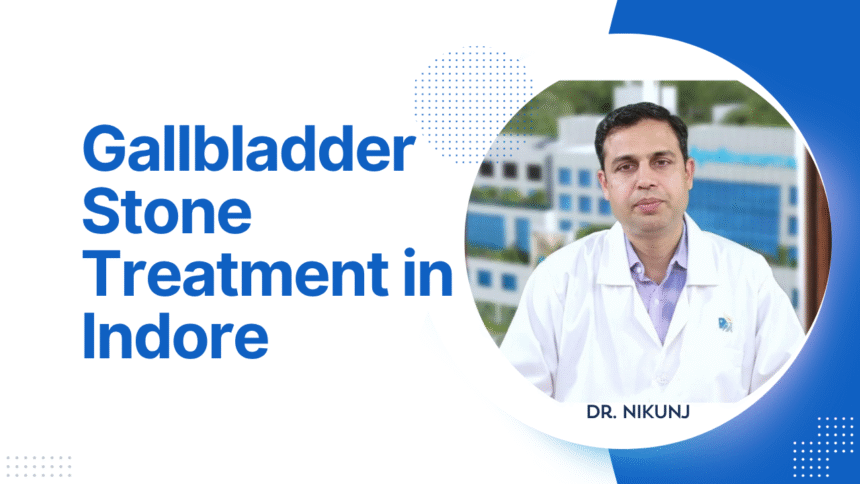Gallbladder stones, or cholelithiasis, are increasingly common among the Indian population due to a mix of sedentary lifestyle, poor dietary habits, and genetic predisposition. These hardened deposits in the gallbladder can cause silent trouble or painful complications if left untreated. If you’re searching for expert gallbladder stone treatment in Indore, Dr. Nikunj Jain stands as a trusted name in laparoscopic surgery and gastrointestinal health. This detailed blog will help you understand everything about gallbladder stones, their symptoms, causes, diagnosis, and the best treatment options available in Indore under the expert care of Dr. Nikunj Jain.
What Are Gallbladder Stones?
Gallbladder stones are crystalline substances formed from cholesterol, bile salts, or bilirubin inside the gallbladder. The gallbladder stores bile, which helps digest fats. When the chemical balance of bile is disrupted, stones can form.
Types of Gallstones:
- Cholesterol Stones: Usually yellow-green in color, these are the most common type.
- Pigment Stones: Smaller, darker stones typically made of bilirubin; more common in patients with liver disease.
Common Symptoms: When Should You Worry?
Gallstones are known as the “silent troublemakers.” Many people are unaware they have them until they experience pain or complications.
Key Symptoms:
- Sharp pain in the upper right abdomen or mid-stomach
- Pain radiating to the right shoulder or back
- Nausea, vomiting, and bloating after fatty meals
- Indigestion or gas-like feeling
- Fever and chills if infection sets in
- Yellowing of the skin and eyes (jaundice)
What Causes Gallstones?
Understanding the root cause is critical in determining the right treatment. Gallstones develop when bile contains too much cholesterol, too much bilirubin, or not enough bile salts.
Risk Factors:
- Age over 40
- Female gender, especially during pregnancy
- Obesity or rapid weight loss
- Sedentary lifestyle
- Diabetes or insulin resistance
- High-cholesterol diet
- Family history of gallstones
- Use of birth control pills or hormone therapy
- Liver or biliary tract disease
Diagnosis: How Dr. Nikunj Jain Confirms Gallstones
In Indore, Dr. Nikunj Jain follows a thorough diagnostic process before recommending treatment.
Diagnostic Tests:
- Ultrasound: Non-invasive and highly effective for detecting gallstones.
- Liver Function Tests: To assess bile duct involvement or infection.
- CT Scan / MRI: Useful if complications are suspected.
- MRCP: Magnetic imaging of bile ducts.
- ERCP: If stones are suspected in the common bile duct.
Treatment Options Offered by Dr. Nikunj Jain
1. Watchful Waiting
If the patient is asymptomatic and gallstones are detected incidentally, treatment may not be immediately necessary. However, regular follow-up is recommended.
2. Medications
Ursodeoxycholic acid (UDCA) can dissolve small cholesterol stones. Used only for patients unfit for surgery due to:
- Slow progress (6–24 months)
- High recurrence rate
3. ERCP
If gallstones are in the bile duct, ERCP can remove them non-surgically. Surgery may still be needed to prevent recurrence.
4. Cholecystectomy (Gallbladder Removal Surgery)
This is the gold-standard treatment for symptomatic gallstones and is Dr. Nikunj Jain’s specialty.
Types:
- Laparoscopic Cholecystectomy: Minimally invasive; quick recovery
- Open Cholecystectomy: For severe complications or prior surgery history
Benefits of Laparoscopic Surgery:
- Short hospital stay
- Faster recovery (3–5 days)
- Minimal scarring
- Lower infection risk
Cost of Gallbladder Surgery in Indore
- Laparoscopic Surgery: ₹45,000 – ₹1,10,000
- Open Surgery: ₹60,000 – ₹1,25,000
Cost may vary based on hospital room, diagnostics, and insurance coverage.
Why Choose Dr. Nikunj Jain?
- Over a decade of surgical experience
- Advanced laparoscopic equipment
- Personalized care & diet planning
- Trusted name with excellent reviews
- Insurance and documentation assistance
Post-Surgery Recovery & Lifestyle Changes
Diet Tips:
- Avoid oily, fried, spicy foods
- Eat small, frequent meals
- Stay hydrated
- Gradually increase fiber
Activity:
- Walk within 24 hours
- Resume light work in 3–5 days
- Avoid heavy lifting for 2–3 weeks
Myths vs. Facts
- Myth: Gallstones can be cured naturally Fact: No proven home remedy exists.
- Myth: Gallbladder is essential Fact: You can live normally without it.
- Myth: Gallstones always need surgery Fact: Asymptomatic ones may not.
- Myth: Antibiotics cure gallstones Fact: They treat infection, not stones.
FAQs About Gallbladder Stones (Answered by Dr. Nikunj Jain)
Q1: How long does laparoscopic surgery take?
A: 30–60 minutes.
Q2: When can I eat after surgery?
A: Clear liquids same day, soft diet next day.
Q3: Is the surgery painful?
A: Minimal discomfort. Pain relief provided.
Q4: Can gallstones return after surgery?
A: No. Once removed, they don’t return.
Q5: Is it covered under insurance?
A: Yes. Documentation support is available.
Conclusion: Book Your Consultation
Gallstones can cause major health issues if left untreated. Under the expert care of Dr. Nikunj Jain, patients in Indore receive trusted, evidence-based treatment through advanced diagnostics and minimally invasive surgery. If you’re experiencing symptoms or have been diagnosed with gallstones, don’t wait—book a consultation with Dr. Nikunj Jain and regain your digestive health with confidence.


Leave a Reply